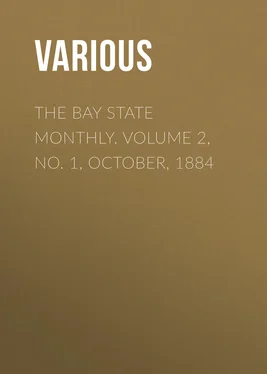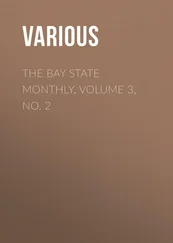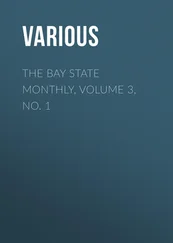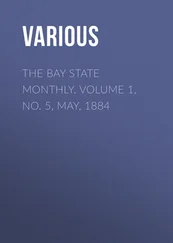Various - The Bay State Monthly. Volume 2, No. 1, October, 1884
Здесь есть возможность читать онлайн «Various - The Bay State Monthly. Volume 2, No. 1, October, 1884» — ознакомительный отрывок электронной книги совершенно бесплатно, а после прочтения отрывка купить полную версию. В некоторых случаях можно слушать аудио, скачать через торрент в формате fb2 и присутствует краткое содержание. Жанр: foreign_antique, periodic, foreign_edu, на английском языке. Описание произведения, (предисловие) а так же отзывы посетителей доступны на портале библиотеки ЛибКат.
- Название:The Bay State Monthly. Volume 2, No. 1, October, 1884
- Автор:
- Жанр:
- Год:неизвестен
- ISBN:нет данных
- Рейтинг книги:4 / 5. Голосов: 1
-
Избранное:Добавить в избранное
- Отзывы:
-
Ваша оценка:
- 80
- 1
- 2
- 3
- 4
- 5
The Bay State Monthly. Volume 2, No. 1, October, 1884: краткое содержание, описание и аннотация
Предлагаем к чтению аннотацию, описание, краткое содержание или предисловие (зависит от того, что написал сам автор книги «The Bay State Monthly. Volume 2, No. 1, October, 1884»). Если вы не нашли необходимую информацию о книге — напишите в комментариях, мы постараемся отыскать её.
The Bay State Monthly. Volume 2, No. 1, October, 1884 — читать онлайн ознакомительный отрывок
Ниже представлен текст книги, разбитый по страницам. Система сохранения места последней прочитанной страницы, позволяет с удобством читать онлайн бесплатно книгу «The Bay State Monthly. Volume 2, No. 1, October, 1884», без необходимости каждый раз заново искать на чём Вы остановились. Поставьте закладку, и сможете в любой момент перейти на страницу, на которой закончили чтение.
Интервал:
Закладка:
But however Mr. Blaine may have distinguished himself as an author, a diplomatist, or a man of varied experience and knowledge, in the present political campaign, in which he is destined to play so important a part, he will necessarily be largely judged in a political sense, and as a politician. What does the record show in these directions? Has he been true or false to his political convictions? Assuredly no man, be he friend or foe, can point to a single instance in Mr. Blaine's long and varied political career, in which he has betrayed his political trust or failed to respond to the demands of his political professions. Through the anti-slavery period; during the trying years of the war; through the boisterous struggle for reconstruction, and constantly since, Mr. Blaine's voice has always been heard pleading for the cause of equality, arguing for freedom, and combating all propositions that aimed to restrict human rights or fetter human progress. That he has sometimes been swayed by partisan rather than statesmanlike considerations is highly probable, but even that can but prove his zeal and devotion to party principles.
No one claims for him political infallibility, and his warmest admirer will admit that he, like other men, has faults. But those who look upon Mr. Blaine as an impetuous and rash politician have but to read his letter of acceptance to see how unjust that judgment is. Calm, dignified, and scholarly, it discusses with consummate ability the issues that to-day are engaging the attention of the American people, and whether it be the tariff question or our foreign policy, he shows a familiarity with the subject that at once stamps him as a man of remarkable versatility and rare accomplishments. As the standard-bearer of the great Republican party, he will unquestionably inspire in his followers great enthusiasm and determination, and, if elected to the high office to which he has been nominated, there is every reason to believe that he will make a Chief Magistrate of whom the entire people will justly be proud.
THE BOUNDARY LINES OF OLD GROTON.—III
The running of the Provincial line in 1741 cut off a large part of Dunstable, and left it on the New Hampshire side of the boundary. It separated even the meeting-house from that portion of the town still remaining in Massachusetts, and this fact added not a little to the deep animosity felt by the inhabitants when the disputed question was settled. It is no exaggeration to say that, throughout the old township, the feelings and sympathies of the inhabitants on both sides of the line were entirely with Massachusetts. A short time before this period the town of Nottingham had been incorporated by the General Court, and its territory taken from Dunstable. It comprised all the lands of that town, lying on the easterly side of the Merrimack River; and the difficulty of attending public worship led to the division. When the Provincial line was established, it affected Nottingham, like many other towns, most unfavorably. It divided its territory and left a tract of land in Massachusetts, too small for a separate township, but by its associations belonging to Dunstable. This tract is to-day that part of Tyngsborough lying east of the river.
The question of a new meeting-house was now agitating the inhabitants of Dunstable. Their former building was in another Province, where different laws prevailed respecting the qualifications and settlement of ministers. It was clearly evident that another structure must be built, and the customary dispute of small communities arose in regard to its site. Some persons favored one locality, and others another; some wanted the centre of territory, and others the centre of population. Akin to this subject I give the words of the Reverend Joseph Emerson, of Pepperell,—as quoted by Mr. Butler, in his History of Groton (page 306),—taken from a sermon delivered on March 8, 1770, at the dedication of the second meeting-house in Pepperell: "It hath been observed that some of the hottest contentions in this land hath been about settling of ministers and building meeting-houses; and what is the reason? The devil is a great enemy to settling ministers and building meeting-houses; wherefore he sets on his own children to work and make difficulties, and to the utmost of his power stirs up the corruptions of the children of God in some way lo oppose or obstruct so good a work." This explanation was considered highly satisfactory, as the hand of the evil one was always seen in such disputes.
During this period of local excitement an effort was made to annex Nottingham to Dunstable; and at the same time Joint Grass to Dunstable. Joint Grass was a district in the northeastern part of Groton, settled by a few families, and so named from a brook running through the neighborhood. It is evident from the documents that the questions of annexation and the site of the meeting-house were closely connected. The petition in favor of annexation was granted by the General Court on certain conditions, which were not fulfilled, and consequently the attempt fell to the ground. Some of the papers relating to it are as follows:
A Petition of sundry Inhabitants of the most northerly Part of the first Parish in Groton , praying that they may be set off from said Groton to Dunstable , for the Reasons mentioned.
Read and Ordered , That the Petitioners serve the Towns of Groton and Dunstable with Copies of this Petition, that they show Cause, if any they have, on the first Friday of the next Sitting of this Court, why the Prayer thereof should not be granted.
Sent up for Concurrence.
[Journal of the House of Representatives (page 264), March 11, 1746.]
Francis Foxcroft , Esq; brought down the Petition of the northerly Part of Groton , as entred the 11th of March last, and refer'd. Pass'd in Council, viz. In Council May 29th 1747. Read again, together with the Answers of the Towns of Groton and Dunstable , and Ordered , That Joseph Wilder and John Quincy , Esqrs; together with such as the honourable House shall join, be a Committee to take under Consideration this Petition, together with the other Petitions and Papers referring to the Affair within mentioned, and report what they judge proper for this Court to do thereon. Sent down for Concurrence.
Read and concur'd, and Major Jones , Mr. Fox , and Col. Gerrish , are joined in the Affair.
[Journal of the House of Representatives (page 11), May 29, 1747.]
John Hill , Esq; brought down the Petition of the Inhabitants of Groton and Nottingham , with the Report of a Committee of both Houses thereon.
Signed Joseph Wilder , per Order.
Pass'd in Council, viz. In Council June 5th 1747. The within Report was read and accepted, and Ordered , That the Petition of John Swallow and others, Inhabitants of the northerly Part of Groton be so far granted, as that the Petitioners, with their Estates petition'd for, be set off from Groton , and annexed to the Town of Dunstable , agreable to Groton Town Vote of the 18th of May last; and that the Petition of the Inhabitants of Nottingham be granted, and that that Part of Nottingham left to the Province, with the Inhabitants theron, be annexed to said Dunstable, and that they thus Incorporated, do Duty and receive Priviledges as other Towns within this Province do or by Law ought to enjoy.
And it is further Ordered , That the House for publick Worship be placed two Hundred and forty eight Rods distant from Mr. John Tyng's North-East Corner, to run from said Corner North fifty two Degrees West, or as near that Place as the Land will admit of.
Читать дальшеИнтервал:
Закладка:
Похожие книги на «The Bay State Monthly. Volume 2, No. 1, October, 1884»
Представляем Вашему вниманию похожие книги на «The Bay State Monthly. Volume 2, No. 1, October, 1884» списком для выбора. Мы отобрали схожую по названию и смыслу литературу в надежде предоставить читателям больше вариантов отыскать новые, интересные, ещё непрочитанные произведения.
Обсуждение, отзывы о книге «The Bay State Monthly. Volume 2, No. 1, October, 1884» и просто собственные мнения читателей. Оставьте ваши комментарии, напишите, что Вы думаете о произведении, его смысле или главных героях. Укажите что конкретно понравилось, а что нет, и почему Вы так считаете.












